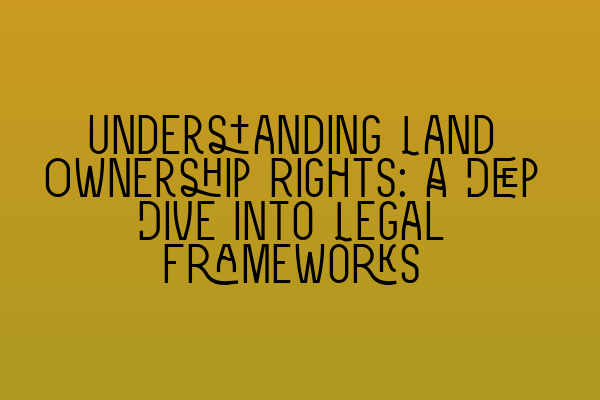Understanding Land Ownership Rights: A Deep Dive into Legal Frameworks
When it comes to property law, understanding land ownership rights is of utmost importance. Whether you are buying a property, inheriting one, or involved in any legal dispute, having a solid grasp of the underlying legal frameworks is essential. In this comprehensive guide, we will delve into the intricacies of land ownership rights, exploring various legal concepts and providing you with a clear understanding of the subject.
1. Freehold and Leasehold
Land ownership in England and Wales is typically categorized as either freehold or leasehold. Freehold ownership grants you full ownership rights over the property and the land it sits on. You have complete control and can make decisions regarding its use or disposal. On the other hand, leasehold ownership means you have the right to use the property for a specific period, as outlined in a lease agreement with the freeholder.
Understanding the distinctions between freehold and leasehold ownership is crucial, as it affects your rights and responsibilities as a landowner. To explore this topic further, check out our related article on SQE 1 Practice Exam Questions.
2. Easements and Restrictive Covenants
Easements and restrictive covenants are legal rights and restrictions that can affect land ownership. An easement grants someone a right to use a portion of your property for a specific purpose, such as granting a neighbor access to their property through your land. On the other hand, restrictive covenants impose certain restrictions on how the land can be used, such as prohibiting certain types of construction or activities.
To navigate the complexities of easements and restrictive covenants, it’s essential to seek legal guidance. Our team at SQE Property Law & Land Law can provide expert advice and assistance. Feel free to explore our SQE 1 Practice Mocks FLK1 FLK2 resources for a deeper understanding.
3. Registered and Unregistered Land
In England and Wales, land can be categorized as either registered or unregistered. Registered land is recorded in the Land Register, maintained by the Land Registry. It provides certainty of ownership, as the registered owner’s details are publicly available. Unregistered land, on the other hand, lacks the official documentation provided by the Land Registry, making ownership claims less straightforward.
To navigate the process of registering land or to understand the implications of dealing with unregistered land, it’s crucial to seek professional advice. Our experienced solicitors at SQE Property Law & Land Law can guide you through the registration process and provide expert assistance. Check out our SQE 2 Preparation Courses for more information on handling registered and unregistered land.
4. Adverse Possession
Adverse possession, commonly known as squatter’s rights, can affect land ownership when an individual obtains legal ownership of someone else’s land by occupying it for a certain period without the owner’s consent. The legal requirements for adverse possession can be complex and vary depending on the circumstances.
If you are concerned about adverse possession or have questions regarding your rights as a landowner, our team at SQE Property Law & Land Law can provide the necessary guidance. Feel free to explore our SQE 1 Preparation Courses for a comprehensive understanding of property law principles.
5. Boundaries and Encroachments
Boundary disputes and encroachments are common issues that can arise between neighboring landowners. Disputes may arise regarding the location of shared boundaries or when one landowner’s structure or use of the land extends beyond their property line.
Resolving boundary disputes requires a thorough understanding of land ownership rights and relevant legal principles. Our experienced solicitors are well-equipped to handle such disputes and provide you with the legal support you need. Contact SQE Property Law & Land Law for expert advice on resolving boundary disputes and understanding your rights.
As you navigate the world of land ownership rights, remember that seeking professional advice is crucial. Our team at SQE Property Law & Land Law specializes in property law and can assist you with all your legal needs. Stay informed and up-to-date by regularly checking our website for updates on SRA SQE Exam Dates.
Hopefully, this deep dive into understanding land ownership rights has provided you with valuable insights. If you have any questions or require legal assistance, do not hesitate to contact us at SQE Property Law & Land Law. We are here to help you make informed decisions and protect your property rights.
